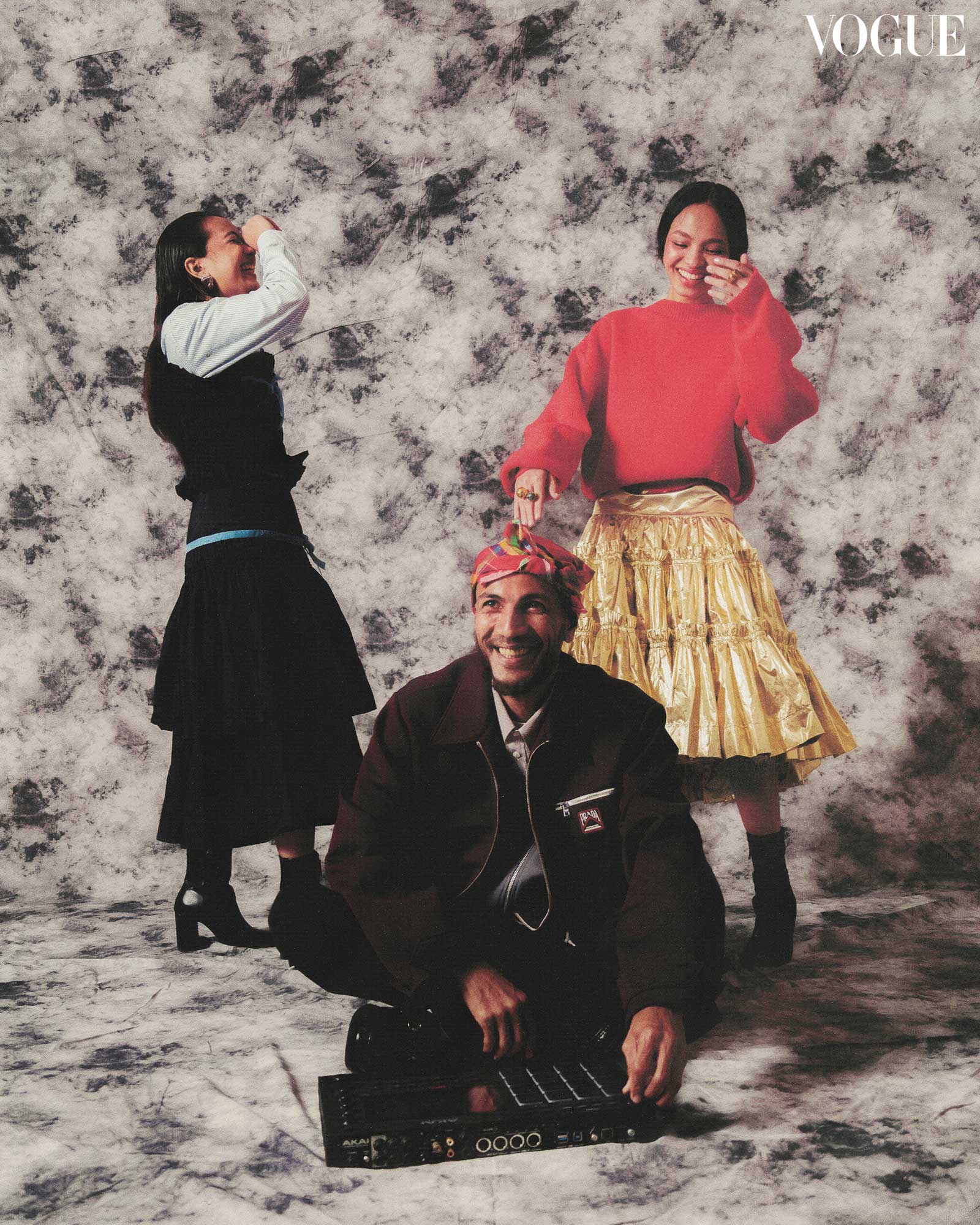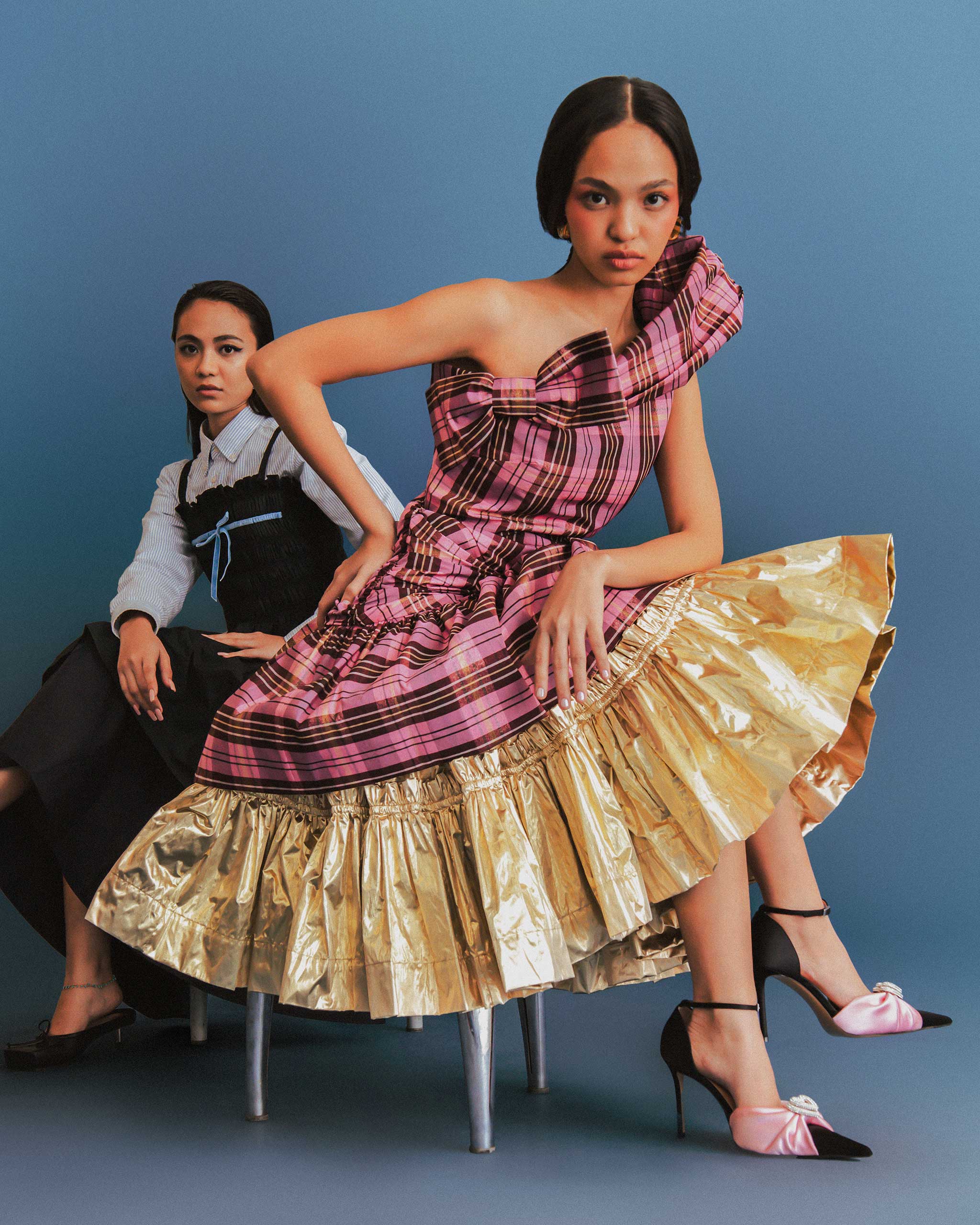Miss A wears a Uniqlo shirt, Molly Goddard top, Molly Goddard skirt, 3.1 Philip Lim skirt from Univers, SUNSPELL earrings, Jacquemus shoes; Fateeha wears a Molly Goddard dress, Molly Goddard dress as a skirt, SUNSPELL earrings, Mach & Mach shoes. Photo by Joseph Bermudez, styling by Neil de Guzman, makeup by Angeline Dela Cruz, hair by Jodi Flong Katalbas.
In a musical culture deeply entrenched in Western influences, sister musicians Miss A and Fateeha of the musical collective Morobeats navigate a hip hop career amidst religious discrimination and internalized shame.
In 2023, hip hop turned fifty. From its birthplace in New York City, the genre and medium has found a home on Philippine shores. One where stories are king, and its gladiators wield the poetics of cerebral wordplay as tools or weapons, depending on who you ask.
“Why make a song if you really have nothing to say?” 21-year-old singer and rapper Fateeha says with a shrug, as she sits across her older sister and fellow rapper 24-year-old Miss A who laughs and adds: “Why speak at all?”
Daughters of Mindanaoan hip hop pioneer and veteran beat maker DJ Medmessiah, the duo write and perform to their father’s beats as the only two female rappers of musical collective Morobeats.

Women in hip hop embody the full spectrum of multiplicities celebrated in the genre, which positions themes of self-identity and self-agency as universal, when so often the female struggle of self-determination is as personal as it is political.
As young female artists of Maguindanaon ancestry, in the relatively young institution of male-dominated Filipino hip hop, the sisters are standing on the shoulders of giants – American femcees whose work serve as modes of instruction through which Miss A and Fateeha are free to inject their distinctly Mindanaoan ingenuity with every cypher and verse (see: Lauryn Hill, Queen Latifah, Bahamadia, etc.).
“We were ashamed of our religion. We were ashamed of our culture. We were ashamed of our heritage,” Fateeha admits, saying: “There was a lot of discrimination growing up. It’s a real thing and the saddest part is we’re not being discriminated against by foreigners, we’re being discriminated against by our own people. It’s ironic and sad.”

Hip hop is a genre that does not relegate artistry to exceptionalism, but rather, celebrates the merits and drawbacks that come to perfecting one’s craft. “That’s the thing about hip hop,” Fateeha explains. “You have to respect yourself before you can gain respect from others.”
“We experienced a lot of bullying and a lot of discrimination. Just by wearing the hijab for example, we had to go through periods of our lives when we were shamed for it,” Miss A shares about their experience growing up in Luzon: “It took us a lot of education and knowledge for us to get to this point of confidence and just be proud of who we are and our background.”
But the lineage of Filipina femcees who have enjoyed the same kind of recognition as their male counterparts remain scarce, despite no shortage of talent. To emcee in particular is a kind of alchemy, playing with elements of speed, rhythm, and rhyme at varying depths of skill is precisely the challenge that Miss A finds most fulfilling as an artist. “It’s the energy of creating something and just channeling my whole perspective, my own story and to change it into another form that makes people understand and relate to it,” she explains.

“It was always in us to just create, to just write,” she recalls, sharing that despite growing up in a household that nurtured their musicality, it was the malleability of hip hop as a vehicle for expression that cemented their interest. As an avid reader with a natural aptitude for storytelling, Miss A says she poured herself into writing, which then grew into a passion for performing altogether.
Similarly, Fateeha always knew she wanted to be a performer, and grew into hip hop later on. “It’s [performing] such a freeing and empowering feeling. What can I say? I’m a confident person! I like the attention,” she says with a self-assured laugh.
“With music, unless you make an impact, people don’t really listen to what you have to say,” Fateeha expounds, “I have a lot of opinions that don’t align with other people’s but with music, it makes it possible for them to hear me out. That’s how I kind of knew that this is what I wanted to do.”

Crucially, the sisters are also emblematic of a new generation of Filipinas whose strength is defined by generosity, self-assuredness, and the spirit of community. Miss A and Fateeha are the faces of a new social force in contemporary Filipino music, one that is informed by a fierce tradition of discipline and honor for one’s heritage. “Mindanao is rich. Our culture is rich,” Miss A asserts, saying: “Culture is the most luxurious thing to have in your life. It’s something a lot of people take for granted or don’t know. The richest thing you can have in your life besides gold, or other material things, is culture.”
“Everyone wants to be Westernized here. Being Filipino or having a certain heritage is something to look down on here. That’s sad because a lot of people feel disconnected within themselves and struggle with finding themselves because they don’t have the passion for their roots,” says Fateeha, with wisdom of her own to throw down, “The most beautiful thing someone can have is wisdom. A lot of people are empty. My family is so full of wisdom and I think that’s what makes me beautiful.”
Photography: JOSEPH BERMUDEZ. Digital Editor: ANDREA ANG. Vogue Man Editor: DANYL GENECIRAN. Art Direction: TINKERBELL POBLETE. Producer: ANZ HIZON. Stylist: NEIL DE GUZMAN. Makeup Artist: ANGELINE DELA CRUZ. Hairstylist: JODI FLONG KATALBAS. Bookings Associate: BIANCA ZARAGOZA. Nails: EXTRAORDINAIL Photographer’s Assistant: ROJAN MAGUYON. Stylist’s Assistant: TICIA ALMAZAN.
- Behind Sarah Geronimo’s Beauty Look at the Billboard Women in Music Awards
- Sound of Music: The Intersection Between Sound And Oneself
- Dance Collective Femme MNL Joins Troye Sivan and Other Southeast Asian Movement Artists in New Music Video
- Style, Sound, & Americana: Tommy Hilfiger Brings Together Music Royalty
